“I hope that at least some of my audience is hearing ‘I’ve Sold Your Organs on the Black Market To Finance the Purchase of a Used Minivan’ and thinking about the relationship between capitalism and health care.”
Eric Gottesman’s CV is one of the most impressive in North American industrial. Starting in the late ’90s as part of cult acoustic/electronic act See Colin Slash, he’s done time as a full time member and a live contributor with countless other acts, culminating with his American coldwave resurrection act Everything Goes Cold. Dude’s roots run about as deep as his ties across the scene, and with the recent signing of EGC to Metropolis Records for the release of their new EP The Tyrant Sun early next year, we figured it was time for I Die: You Die to pester him extensively with questions about humor, comic books and the growth of Everything Goes Cold.
ID:UD: Everything Goes Cold has a reputation for being part of the wave of North American industrial with a humorous bent to its approach, but your songs are still always about something – they’re substantial rather than just being jokes. How do you navigate using humor without letting it eclipse the rest of Everything Goes Cold?
Eric: I try to think of the funny stuff I do as “satirical” rather than humorous, and I think that keeps things in perspective. There are certainly EGC tracks that are humor tracks – “The Droids You’re Looking For” doesn’t have a bunch of politics or personal strife behind it, obviously – but I try to be more Jon Stewart than Adam Sandler, I suppose. And I think there can be substance to jokes, and to joke songs. The Gothsicles do a lot of joke songs, but there’s substance in why we enjoy those jokes. “Nine Dudes Freaking Out” is funny to me because I spend a lot of time in nightclubs and the song demands that I think about my relationships with the people there in a different way. I think all good comedy should present the audience an unusual perspective, if nothing else. I hope that at least some of my audience is hearing “I’ve Sold Your Organs on the Black Market To Finance the Purchase of a Used Minivan” and thinking about the relationship between capitalism and health care. Some people will probably read that and think I’m stretching, but I’m not – satire operates by taking things to obviously ridiculous extremes.
I’ve been saying frequently that as we move forward, I’m thinking of the band more in terms of being “cartoonish” than funny. I’ve been focusing in on a character that’s developing in the lyrics and a slightly different character (the fridge, Edgar G. Chillingston) on our social media. The character in the lyrics – the archetypal supervillain – is a reflection of a lot of the elements of our lives that I set out to satirize. Political leaders, objectivists, social activists, myself, other industrial musicians, whatever. Characters only endure when we can identify with them. I’ve always identified more with villains, and I’m sure the same can be said of many of our listeners. Cobra always had cooler outfits than GI Joe, yet we’re supposed to hate them. I think that’s a dynamic that’s worth examining.
ID:UD: Similarly, your forthcoming EP is titled The Tyrant Sun, a reference to Grant Morrison’s DC One Million and All-Star Superman. While comic book and science fiction references aren’t new to the genre, how do you approach making them a part of your music? How important are those influences in your creative process?
Eric: Comics have become extremely important to my creative process over the past couple of years. I read a lot of comics – mostly mainstream superhero books, and mostly Marvel – and I try to work some of the depth I find in these expansive, 50+ year-old shared universes into my music. The voice I’m speaking in with my lyrics – even on the “serious” songs – is based pretty firmly on Doctor Doom most of the time, in terms of motivation and character. I really loved All-Star Superman, and obviously yes, The Tyrant Sun takes its name from those books. The genesis of that is that the upcoming album has been intended to be named Everything Goes Cold Black Out the Sun for some time, and I wanted the EP that preceded it to be connected in some manner, so that the two go together. Thus the “sun” theme. As it’s turning out, I’m pretty sure there will only be one track from the EP on the album, but I think they’ll feel good as a unit.
My introduction to industrial music – which was really my introduction to music that I could identify with – was during the mid-’90s, so everything was full of Robocop samples and science fiction themes. The music in the clubs was getting on high-profile sci-fi movie soundtracks. That stuff has always been more important to me than the more cerebral ’70s and ’80s themes, or the more introspective themes that we see more of today, so sci-fi and industrial music go together naturally to me.
“Necro Facility, Aesthetic Perfection, Angelspit, Dismantled, the new Haujobb. That’s the music that’s inspiring me these days.”
ID:UD: The sound of EGC is very much in the American coldwave tradition, which fell out of favour around the turn of the millennium as futurepop took off. Are you consciously trying to explore where that sound might have gone had it continued to be popular? Do you think of yourselves as a coldwave band?
Eric: My answer to this now is going to be drastically different than it would have been had you asked me a year ago. I spent a long time – an entire decade, really – obsessed with American coldwave. When I was 18 I briefly worked for 21st Circuitry Records, and Don Blanchard gave me this huge pile of music that was exactly what I needed to hear at the time – a very angsty time, I will tell you – and I basically spent ten years collecting almost every fragment of the genre. I have just about every weird independent release of a band that had one track on a ReConstriction compilation, every stray promo cassette from an east coast label that lasted for five minutes, everything. 21st Circuitry, ReConstriction, Fifth Column, COP Int’l (who I also worked for, and are still around putting out tons of amazing releases,) all that. Then not long ago I had my collection playing on random and after I’d skipped through like fifteen throwaway tracks by Non-Aggression Pact, Gracious Shades, Black Rain (the band, not the label), Circus of Pain, Argyle Park, who knows what else…I realized that the huge majority of it is really not good, I just got obsessed for a while there. Each of those bands had at least a couple of good tracks, by the way, so I don’t really intend to put them down entirely, but they all put out a ton of filler too. Okay, actually I still love that Argyle Park album. Anyhow, the point is that I’m trying to get away from that a bit now.
The big guys and my personal favorites are definitely still informing what we do: Hate Dept., Diatribe, 16volt, Acumen Nation, Chemlab, Society Burning, and Christ Analogue especially. But 2011 has been an astounding year for new industrial music, and that’s what’s really driving me right now. Necro Facility, Aesthetic Perfection, Angelspit, Dismantled, the new Haujobb. That’s the music that’s inspiring me these days.
I’m betting that the other neo-coldwave guys – Cyanotic, Hardwire, Rabbit Junk, and Left Spine Down – are probably feeling similarly about coldwave to some extent, although our listening habits all differ drastically. I think I’m the only one who’s really super into the newer dance-oriented industrial stuff between us. But I think we all had to do some really traditional stuff to get going and give the genre a proper sendoff and tribute. When I started working on EGC (which was actually back in 2003, believe it or not) people still seemed to have a really bad taste in their mouths about coldwave. I was still hearing “it’s a metal band with a keyboard!” when I’d mention a lot of that stuff. I think we – and definitely Psyclon Nine, and a few other bands – helped knock people out of the “guitars aren’t industrial” mindset, and now we’re seeing guitars all over the place again and I’m thrilled with it.
By the way, the new Left Spine Down album, Caution, is one of the best albums I’ve picked up this year. Get it. Serious. [We concur. – ed.]
“Nothing is more insulting to me as both a musician and a member of the audience than a guy rocking an unplugged keyboard.”
ID:UD: We enjoyed your set at Kinetik last year, which had a very “live” feel throughout. People often complain about laptop sets and backing tracks – is that something you deliberately push against, or is the absence of that a function of the style of EGC’s music?
Eric: Well first let me be clear that we have backing tracks, but we work very hard to make sure they don’t make things feel less “live.”
Two things are of paramount importance to me when setting up a live show – first is that above all else, I will not lie to the audience. Any show that has instruments on stage that are not generating the sounds that the audience is hearing is, to me, dishonest. There are RARE exceptions to this for theatrics (Laibach comes to mind), but nothing is more insulting to me as both a musician and a member of the audience than a guy rocking an unplugged keyboard. I won’t do that. Keyboards that double sounds already on backing tracks aren’t my favorite thing either. The other important thing is that both the band and the audience have to feel a certain level of energy and engagement that only comes from live music. Maintaining that with electronics can be very difficult.
I’ve experimented with all sorts of configurations for live performance with electronics over the years. In See Colin Slash, we had this crazy hardware sequencer from 1986 that had all these loop trigger buttons. It took an insane amount of time to program, and nobody was ever really able to get the hang of playing it live except me (which I rarely did because I was also singing), but I was so obsessed with not having backing tracks that I thought it was the thing to do. Ultimately the audience didn’t care because they still just saw some dude huddled over a little electronic box – it just errored out more often than a CD player would have. At the same time I was playing in Deathline Int’l and Psyclon Nine (when it was just me, Nero, and Josef, with no drums) and I kept thinking that I wasn’t getting the same energy I got from playing in a goth-rock band in high school when we played live. Finally Nero hired Filip Abby (…who later started going by Abbey Nex, and now plays guitar for Combichrist) to play drums for P9, and I realized that it was never the backing tracks that were making the shows feel less live to me, it was the lack of real percussion.
So that was a big thing I had in mind when I started getting live stuff together for EGC, but I also wanted to have our electronics presented in a more dynamic manner than just “hit play, tracks go.” The system we’ve settled on is complex at times, but it works well and is transparent to the audience. Most songs have a single stereo backing track with the “main” elements that, for whatever reason, can’t just be played by Mike, our keyboardist. This generally contains an electronic kick, maybe some percussion loops, fills, etc. It’s dense on some tracks, almost nothing on others. Then there’s usually a second track with something that can be controlled in some manner, although it’s not playable by a human. This is usually something like an arpeggiated bassline with a MIDI-controllable filter over it. The sequencer will also send a click track to Kenny our drummer, control softsynths to be played by myself or Mike (this is why it may appear that the same key is creating two different sounds without any obvious patch change if you see us live), and change my vocal effects over the course of a song, freeing me from having to mess around with foot pedals or something. Then James makes guitar noises with his mouth or whatever. I don’t know.
What the audience sees, of course, is just four guys playing instruments, hopefully with the awareness that what they’re hearing is what they’re seeing. If we all died on stage, you’d be able to keep dancing until the end of the song, but you’d just be hearing a shell. Everything important, we are playing live.
“From stylistic changes to the collapsing music industry to the simple fact that Metropolis is a more well-run business than most, that’s the place to be.”
ID:UD: You wrote a very nice note about the move from Bit Riot to Metropolis, mostly focusing on band/label unity and the support you received from BR. We’re curious about what prompted the move to Metro.
Eric: It’s no secret that basically every successful industrial band in the US is on Metropolis. For a variety of reasons ranging from stylistic changes to the collapsing music industry to the simple fact that Metropolis is a more well-run business than most, that’s the place to be. I’ve been friends with Dave Heckman, who owns Metropolis, for a long time, and he offered to sign us nearly a year ago. As much as I love Bit Riot, I knew that if I wanted to take the band to a higher level, that was the thing to do.
Perhaps this will work as an analogy: say you’re a kid who wants to grow up to become President of the United States, and you find an independent political party that really speaks to you. You rise through the ranks, maybe become a state senator or something, and you’ve done really well with the party’s support… But if you really want to be President and do the things you want to do, you’ll ultimately have to align yourself with one of the big two. If your supporters believe in what you’re doing, as Bit Riot did with us, they’ll be happy to see you bring your message to a wider audience.
I thought it was particularly important to post that note because so many bands have nothing but bad things to say about their labels, and leave in a huff over unfulfilled expectations and trifling disputes. I wanted to be perfectly clear that we’re leaving on the best of terms, and we will continue to support Bit Riot while we’re on Metro.
ID:UD: You’ve personally been in projects as wide-ranging as See Colin Slash, Psyclon Nine, and involved with several more (like Caustic) in various capacities, but EGC seems very much to be “your” band. How did you transition into the role of frontman as well as musician? Do you have any other personal projects in the works?
Eric: I was actually frontman first – I was doing See Colin Slash in 1998, and split the frontman duties with Greg Dunn. The big challenge with EGC was that I no longer had anybody pushing back against my bad ideas, so I’ve had to learn to reign myself in a lot. For every cool thing we do, there were a hundred ludicrous ideas that I had to talk myself out of.
I don’t think I was a very good frontman, at least live, for the earlier part of my career. Actually I can’t say I was particularly engaging on instruments, either. It’s really only in the past year or two that I think I’ve developed the stage presence and persona that I really needed to put on a good show, and meet my own standards. That was definitely helped by playing shows with, or repeatedly watching, some of the really great frontpeople we have in this scene. Andy LaPlegua, obviously, Daniel Graves, Jennifer Parkin, and Nero from P9 are all outstanding performers, and I’ve learned from each of them.
As for other personal projects- I’ve been toying with the idea of following up on some ideas I had for See Colin Slash’s acoustic covers. The very last thing that Greg and I did was a not-at-all-funny cover of Spahn Ranch’s “Heretic’s Fork,” and I think he’d agree that it was the best thing we ever did. You can get that on our best-of, Fish In a Bag, which is still available wherever. Anyhow I’ve thought about doing more of that sort of thing just on my own, so you might see that in the nearish future.
ID:UD: Presumably you’re still going to be collaborating and involved with other people’s work in various capacities. What’s on the docket?
Eric: Weirdly, nothing at the moment! It’s actually kind of relieving, although I’ve been so stressed out about EGC stuff lately that it’d be nice to get on the road and not be in charge for a while. Possibly playing very poppy music. Possibly with a naked drummer. Possibly with some Canadians. HINT HINT.
None of the bands I usually play with are touring right now and nobody new has asked me lately, but winter is always a bit dead so I’m sure something will come up in the next few months. I think I heard Erica making rumblings about some Unter Null dates in Europe, so I might try to cram myself into that. (That’s what she said.)
ID:UD: On a related note, Deathline International had a track on the Electronic Saviors: Industrial Music To Cure Cancer compilation, but we haven’t heard of anything since then. Is there any more news from the Deathline camp?
Eric: Well, Count0 recently moved himself and the whole COP Int’l operation to a new location, and I know that’s been eating up a lot of his time. Plus he and James Perry both got married this year, so things are moving a bit slower than normal for them musically, I’m sure. I believe they have a track on the new Electronic Saviors comp as well.
They have a ton of material basically ready to go right now, I can tell you, but they’re being incredibly perfectionist about it and they’ve been tweaking the songs literally for years. I think this is ridiculous – it’s literally been a full decade since Cybrid came out – but I’m sure it’ll be appropriately epic when it actually gets out to the public. There may be some remnants of me floating around when it does get released (and I actually wrote some of the guitar parts on the track from the first Electronic Saviors), but it’s literally been years since I actually sat in the studio and worked with DLI.
“23-year-old cyber kids don’t want to hear Siouxsie or Bauhaus. That’s their parents’ music.”
ID:UD: Your club night Anti/Life just started in San Francisco. What’s your approach to working as a DJ and a promoter? How has your lengthy resume as a musician in the scene influenced what you want Anti/Life to be?
Eric: I am in fact working on a new nightclub night in San Francisco, called Anti/Life, which begins in January. I am NOT DJing this event – I know a lot about music, but I’m not a skilled or trained DJ, and it bothers me when people just label themselves as such and have at it.
I’ve never promoted a club night before, but of course I’ve spent a ton of time, effort, and money promoting events for the band. I don’t really like promoting things – I always feel like a bit of a tool trying to convince people to come to an event – but circumstances came about that sorta left me in a position where I felt like I had to, in this case. I complain a lot when the clubs around here aren’t running how I’d like them to, and I was starting to feel like an even bigger tool for not doing anything about it.
Anti/Life’s primary goal is to get more new music played in the San Francisco scene. Right now the two biggest Goth/Industrial clubs that we have, Death Guild and Dark Shadows, are structured to play a fairly even mix of classic and new tracks, and tend to lean on the classics. We have a small scene here – smaller than we should – and I believe that playing too much old music alienates the younger crowd, and does little to draw in anybody new at any age. 23-year-old cyber kids don’t want to hear Siouxsie or Bauhaus. That’s their parents’ music.
Anyhow, my partner Fushia and I are getting a lot of help from Rev. John from Das Bunker, and we’re working with our favorite DJs from the local scene (including Death Guild and Dark Shadows, of course) to try to put something really fun together. Sam P., formerly of Imperative Reaction, System Syn, and Inure (and also one show with EGC) is doing our artwork and design, as well as some consulting. I’ve tried to integrate things I’ve liked about clubs I’ve visited in cities across the country, and cool things about old SF clubs (like Roderick’s Chamber, which you’ll remember if you’re old and local). If it doesn’t do well it may be a short-lived venture, but as of now we’ll be at a very swank venue called Cafe du Nord first Wednesdays of each month, starting January 4.
“Casual listeners and club-goers don’t go to shows anymore, because they weren’t having fun at shows, because the shows weren’t good.”
ID:UD: Sadly, we’ve seen a major drop-off in the number of live industrial shows that occur in the Pacific Northwest. That said, it also seems like there’s still a relatively decent number of grassroots shows and tours going on elsewhere. Can you comment on what the difference might be regionally that could account for that? Has the audience for live shows shrunk as much as it appears from a cursory glance?
Eric: Well that’s easy. There are no longer any promoters in the San Francisco area that will take on small or medium-sized industrial shows, and immigration policies and closing venues have made Vancouver a difficult option for touring US bands – and an even worse option for touring European bands who don’t want to worry about getting back in to the US after they leave for a day. That means that if you’re any smaller than, say, Imperative Reaction, if you do the Pacific Northwest you have Portland and Seattle surrounded by dead days. It doesn’t make sense financially or time-wise, so people just skip the region.
On the East Coast, of course, the cities are much closer together, so touring the same amount of geographic space costs less. If you want to do the West Coast and hit the same number of cities, you have to start thinking about places like San Diego or Sacramento, which means poaching audiences from LA and (if you can get it) San Francisco, which causes other problems.
The audiences have shrunk in some places, grown in others. There are a few things going on here: first is that the entire industry is having problems, genres are spread too thin, and people don’t like going to clubs or shows in difficult economic times. They go to bars instead, and spend the same amount of money, but they don’t feel guilty about it. Also venues are shutting down all over, and club owners don’t want to take risks.
The so-called “War On Fun” that’s happening all over the US certainly isn’t helping either – if you’re not familiar, that’s a trend toward insanely aggressive enforcement of prohibition-era laws and regulations being used to shut down concert venues for the convenience of law enforcement or NIMBY neighbors. In San Francisco’s case, there’s also an issue with some vindictive and power-hungry state regulators. [The DNA Lounge’s persecution at the hands of rogue ABC agents is so shady that news of it has traveled north to our Canuck ears – ed.] I recommend you check out Stop The War On Fun for more info on this issue in California, and get involved if you can. It might seem like an insignificant issue in the face of foreign wars and economic collapse, but government attacks on concert venues is a serious free speech issue, and a single venue shutting down can mean dozens of people losing their livelihoods.
So all that’s happening, and there isn’t much we can do about it from a “scene” standpoint.
“The onus is on the musicians in this scene to make sure that the show they’re putting on is something special enough to get people to come back.”
The next thing is that we had almost a full decade of consistently crappy live shows from industrial bands, pretty much across the board, and I think that caused a big division between people who would go to clubs and people who would go to shows. All those second and third-tier futurepop and terror EBM bands might have put out some decent albums, but their shows were generally flat-out awful. And I think everybody probably knows basically what I’m talking about here – two man shows where one guy is not playing a keyboard and the other guy is half-heartedly warbling out of his vocal range.
Casual listeners and club-goers don’t go to shows anymore, because they weren’t having fun at shows, because the shows weren’t good. The five superfan guys who just REALLY loved that album will consistently show up for that. And people who show up to everything out of some sense of obligation, and the really serious geeks who are just so excited about the idea that they’re at a REAL CONCERT and they get to meet MUSICIANS. But not the punk rocker who wanted to check out something different for the night, or the person who liked that one song they heard on the dancefloor last week. We desperately need those people back, and we have to convince them that it’s worth their while to show up.
Some regions and promoters have accomplished this – Das Bunker is an obvious one. I <3 Industrial in Philly. Quorum in Cincinnati, which unfortunately shut down recently, but only after several years of shows that were WAY bigger and WAY more successful than you'd think for the area. The late great Sadisco* in Phoenix. All four of them made it their business to put on great events that also had great bands, so people would show up and expect to have fun, even if they didn't know much about the performers. Part of what raised that level of expectation was choosing bands they knew would perform well. That's part of the promoter's job. But I think the onus is on the musicians in this scene to make sure that the show they're putting on is something special enough to get people to come back, or it's just going to get harder. ID:UD: It’s been a few years since Vs. General Failure‘s release. How has ECG’s sound changed since then, and how will “The Tyrant Sun” reflect those changes (if any)?
Eric: One big thing is that I’ve gotten really, really in to chiptune/8-bit music, and you’ll be hearing some of that in my sound choices. There’s music by Bit Shifter, Binarpilot, Anamanaguchi, Trash80, Crashfaster, and USK that has really altered my way of doing things lately. This will be a lot more evident on the upcoming album than on the EP, but some of that has definitely already seeped in. Also, there’s definitely less coldwave guitar in this release, as I discussed earlier, and it’s a bit dancy-er, but without sacrificing any of the weirdness. I’m hoping that will draw some new people in without pissing off our current fans.
I think casual fans especially will notice a thematic shift. There’s one song on the disc called EBM/OGS which is almost a farewell of sorts to the flat-out funny tracks. I had a concept for a humor-oriented track that I wanted to get out, but I didn’t think it would be appropriate for the album, and EPs with remixes don’t need to strive for the same level of consistency that I’d like on a full-length, so it’s there… But if you listen to the first track, Solaris, going straight in to the second, The Iron Fist of Just Destruction, It’s definitely evident that we’ve taken a different tack than something like I’ve Sold Your Organs On the Black Market To Finance the Purchase of a Used Minivan. I hate to say we’ve gotten “darker” because that sounds incredibly cheesy… But yeah, I guess we’ve gotten a bit darker.
That shows up in the artwork, too. The artwork on our prior stuff was by Stitchmind, who also designed Edgar G. Chillingston, the fridge mascot. It’s very whimsical and comic, and I think that really highlighted what felt was unique about the band to me at the time. We’re still working with Stitchmind on a lot of things, especially stuff like T-shirt design. Hopefully we’ll do a second issue of the comic book that comes with the Ice Brigade Membership Pack (still available from Bit Riot!) with him as well. For the new disc, however, we went for a more realistic, somewhat gritty look. I worked with Vlad at Kallisti:Design (who has also done work for Nachtmahr, Uberbyte, XP8, and Be My Enemy, to name a few) to conceptualize a more photo-realistic fridge robot with a greater sense of menace for the cover. There’s also (hopefully) going to be a crazy special physical edition with special packaging and bonus tracks announced very soon, but DO NOT LET THIS DISSUADE YOU FROM PRE-ORDERING FROM METRO NOW! We’re going to set it up so you can get the special part from us separately, so if it’s not available yet when you read this, still go buy!
That about sums it up. I have to say, this was possibly the most well-researched interview I’ve ever done in any band. I’m kinda weirded out by it, and I think you might be stalking me. If you are, you should pick up my groceries for me because you probably already know what I need.
The Tyrant Sun comes out on February 28th on Metropolis. Eric, we’ll drop off your organic pomegranates, Hungry-Man All-Day Breakfasts, and Bowel Buddy bran wafers on Saturday. Also, you should probably get a lock for your trash cans. Just sayin’.



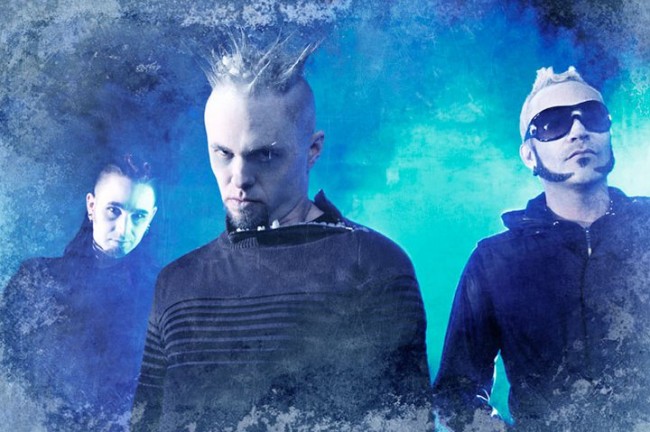
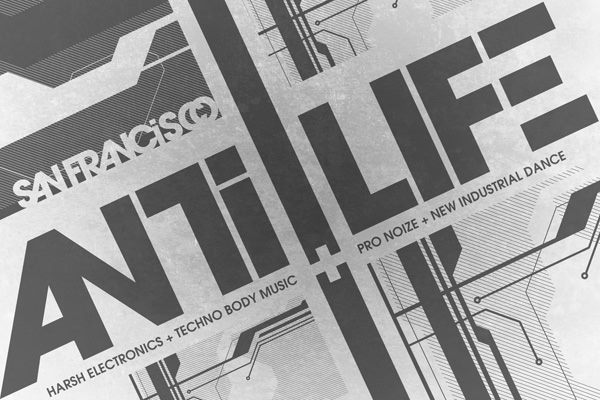
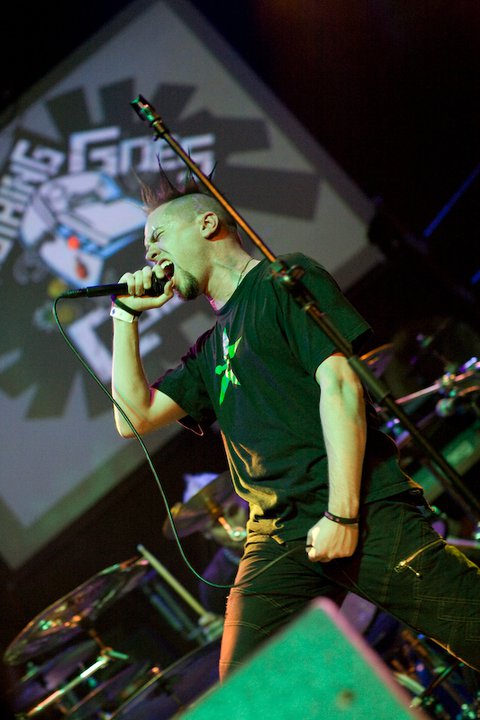
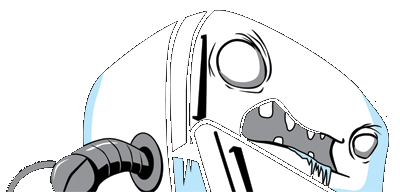
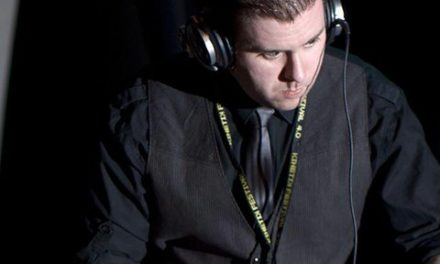
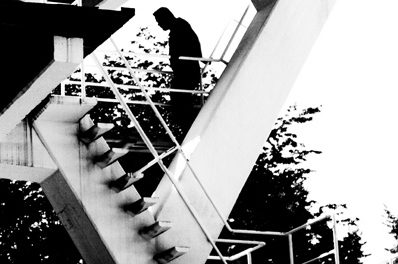
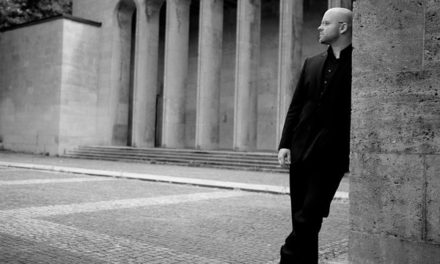
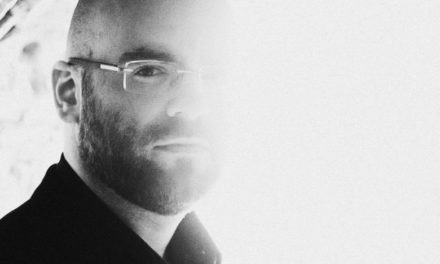
“We have a small scene here – smaller than we should – and I believe that playing too much old music alienates the younger crowd, and does little to draw in anybody new at any age. 23-year-old cyber kids don’t want to hear Siouxsie or Bauhaus. That’s their parents’ music.”
MY PARENTS LISTEN TO CHRISTOPHER CROSS
Christopher Cross will make you Jump, Jump.
EGC, on the other hand, gives good interview.
Dis interview iz gr8
Great interview guys!